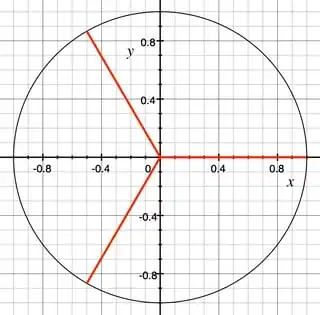By summing up the geometric series, it can be shown that,
$$\sum_{k=0}^{n-1} e^{2\pi i\frac{k}{n}}=\frac{1- e^{2\pi i\frac{n}{n}}}{1- e^{2\pi i\frac{1}{n}}}=0.$$
However despite having proof of this fact, it feels somewhat magical that the (signed) heights and widths of the right triangles formed by equally partitioning the unit circle always sum to zero.
Consider the case with $n=3$, then we have
It's fairly easy to see in both this example, and in the general case, that the imaginary part always cancels by complex conjugate symmetry.
However even in the case of $n=3$, one does not have pairwise cancellation of the real part. Instead the right triangle widths corresponding to the two non-zero angles together are required to cancel out the third angle's corresponding width, i.e.
$$\cos\frac{2\pi}{3}+\cos\frac{4\pi}{3}=-1,$$
which to me is an entirely non-obvious fact.
So I'm wondering if there exists some argument by symmetry, from which one can deduce that $\sum_{k=0}^{n-1} e^{2\pi i\frac{k}{n}}=0$.
